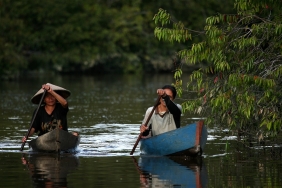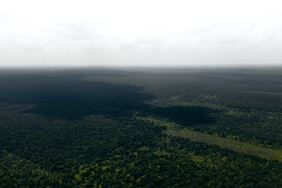INDONESIAN ULEMA COUNCIL URGES PEOPLE TO MONITOR ILLEGAL TRADE IN ENDANGERED ANIMALS
Indonesia's abundant biodiversity has earned the country the nickname mega biodiversity country and placed Indonesia in third place as the country with the richest biodiversity in the world, after Brazil and Colombia.
This richness is not only a source of pride but also a target for illegal trade, leading to high extinction rates. One of the major threats facing Indonesia's animal populations is the high rate of poaching and illegal trade, which in turn affects the balance of the ecosystem, even though a balanced ecosystem is essential to support human life today and for generations to come.
If the balance of the ecosystem is disturbed, it will have a negative impact on the social, cultural and economic life of the people, especially those living around the forest. One of the most immediate impacts is the escalating conflict between humans and animals. To overcome this, there needs to be general public involvement in protecting nature and ensuring that the balance of the ecosystem is maintained.
Preserving Indonesia's biodiversity is not only the duty of the Indonesian government, but also of all Indonesian citizens, including Muslims. For this reason, the Indonesian Ulema Council (MUI) responded through the issuance of Fatwa Number 4 of 2014 concerning the Preservation of Rare Animals to Maintain Ecosystem Balance. On May 2, 2018, MUI's Environmental Breeding Institute together with WWF-Indonesia and National University's Center for Islamic Studies held a socialization of Fatwa No. 4/2014 on Rare Animal Preservation to Maintain Ecosystem Balance.
This fatwa is important to always be reminded, therefore socialization is often held to stakeholders, especially local DAIs, especially DAIs who live around Pramuka Market. This socialization presented several speakers who are experts in the field of conservation and environmental breeding, including Meidiyanto (WWF-Indonesia), Ahmad Munawir (Chairman of DKI Jakarta BKSDA), and K.H. Ma'rifat Iman (Member of MUI Fatwa Commission) and moderated by Hayu S. Prabowo (Chairman of MUI Environmental Breeding Institute).
The event was held at the Central MUI Office, Central Jakarta, and invited representatives from the Mosque Prosperity Council (DKM) around the Pramuka Bird Market. It is intended that the DKM representatives become environmental agents by preaching and educating the community around their mosques to contribute to preserving endangered animals and the balance of nature.
On this occasion, Meidiyanto as a representative of WWF-Indonesia's Wildlife Crime Team gave a presentation on the condition of illegal trade in protected wildlife in Indonesia. "The illegal trade of protected wildlife is a serious global problem and is part of transnational crime. The main reason for the rampant trade of protected wildlife is the high demand from the public for the consumption of wildlife, both alive and their body parts," said Meidi in her presentation session. Meidi also explained the modes used by the perpetrators of this crime, as well as what kind of protected wildlife products are widely circulated in the illegal wildlife trade chain.
In addition to Meidiyanto, the Head of DKI Jakarta BKSDA Ahmad Munawir was also present and gave a presentation on the portrait of illegal protected wildlife trade in Jakarta, especially in animal markets such as Pramuka Bird Market, Barito, and Jati Negara. "One of the bird markets in Jakarta, Pramuka Bird Market, has been named the largest animal market in Southeast Asia. Therefore, proper supervision and governance must be done to ensure that it does not pose a threat, both in environmental, economic, and social aspects," said Ahmad Munawir. Munawir also explained that DKI Jakarta BKSDA has made many efforts to eradicate the illegal trade of protected wildlife in Jakarta, one of which is to establish a special complaint phone number to report illegal wildlife trade encountered.
The next presentation was given by K.H. Ma'rifat Iman who provided knowledge to the participants about MUI Fatwa Number 4 of 2014 concerning the Preservation of Rare Animals to Maintain Ecosystem Balance. K.H. Ma'rifat Iman said that we humans should protect nature and its contents in order to create a balance of ecosystems that provide benefits to the lives of humanity itself. "Humans were created by Allah SWT as caliphs on Earth (khalifah fi al-ardl) carrying the mandate and responsibility to prosper the earth in its entirety. Unfortunately, today many rare animals such as tigers, rhinos, and orangutans as well as various types of reptiles, mammals, and aves are threatened with extinction due to human error," he said. In his presentation, K.H. Ma'rifat Iman also asked the participants from the representatives of the Mosque Prosperity Council in Jakarta to spread the message contained in MUI Fatwa Number 4 of 2014.
Religion is one of the approaches that can be chosen as a method of socialization and education, which can be used to influence people to preserve animals and prevent species extinction. As taught in every religion, humans not only have a good relationship with God, but also with other humans and must live in harmony with nature. Therefore, if all parties can carry out their respective functions and roles, it is not impossible for us to make the dream of quality animal conservation and a well-maintained ecosystem can be realized easily.





